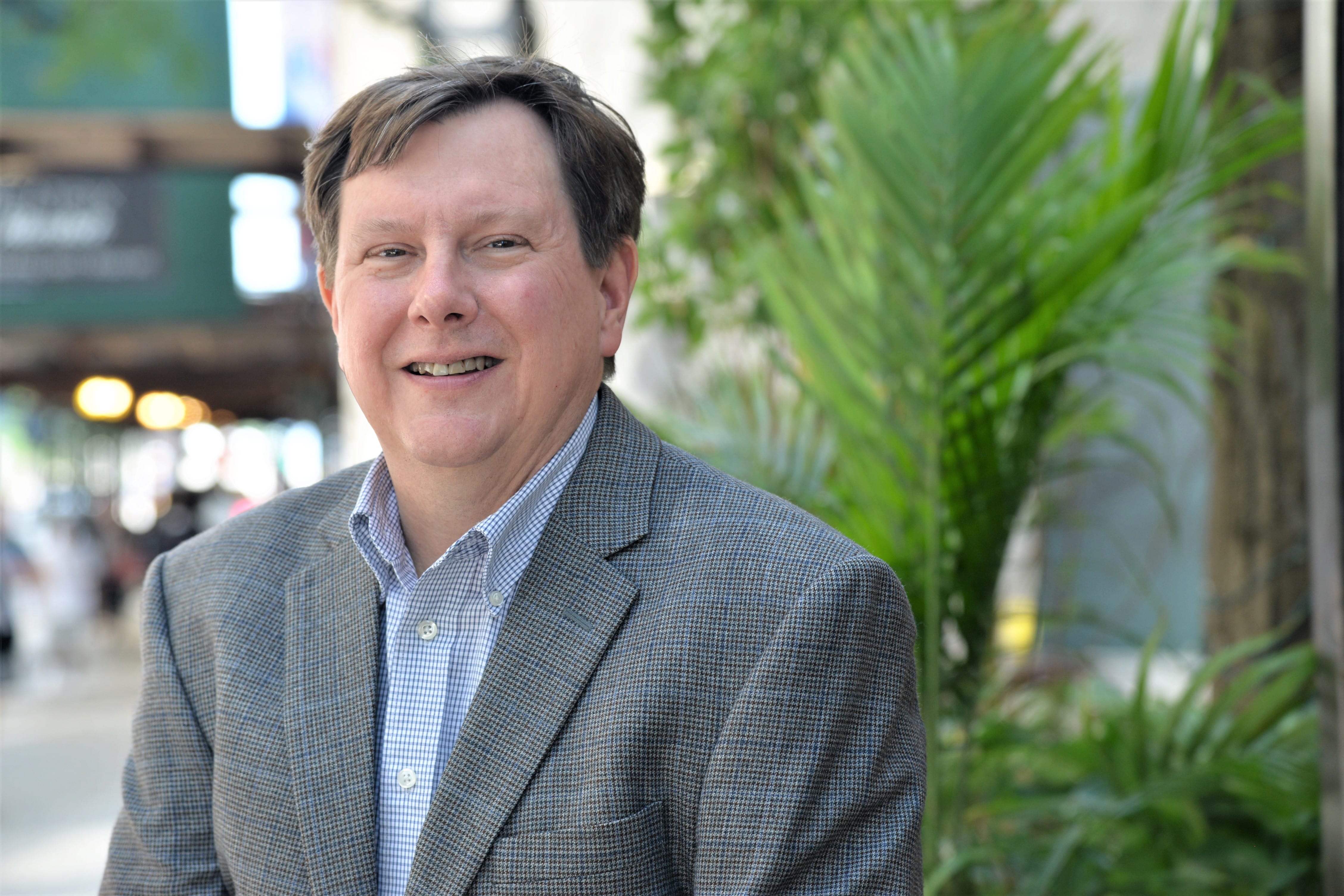
by jlansber | Oct 3, 2018 | Giving Back
Matching Gift Launches Accounting Student Initiative
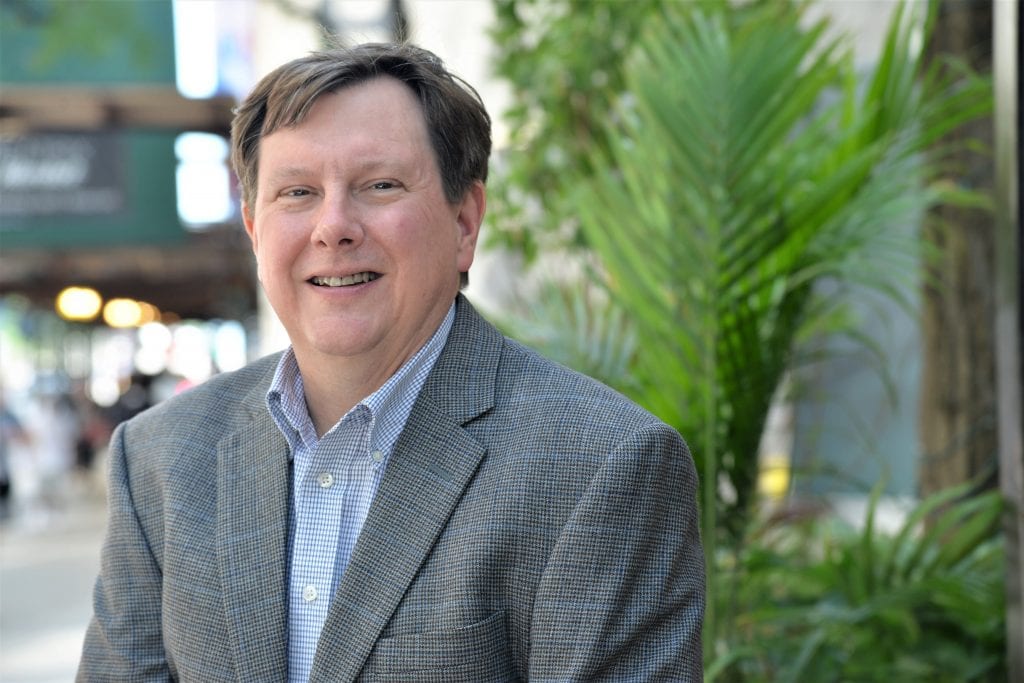
Kent Klaus (BUS ’82)
When Kent Klaus (BUS ’82) looks back at his undergraduate years at DePaul University’s Driehaus of College Business, one thing stands out: the mentoring he received along the way.
“DePaul is unique in the ways that it supports our students by giving them access to lots of mentoring. I am a strong believer in the power of mentoring and credit it with being a lifelong key to my success,” says Klaus, a partner in Global Employer Services at Deloitte Tax LLP who also has served as an adjunct instructor at the Driehaus College of Business periodically since 1988.
Raised on the Southwest Side of Chicago, Klaus commuted to DePaul. As a sophomore, he landed his first professional job at an accounting firm, which he found through DePaul’s Career Center. After 20 years at Arthur Andersen, Klaus began working for Deloitte in 2002. He and his wife, Susan, live in Mount Prospect, Ill.
If it weren’t for DePaul, I wouldn’t be where I am today. I want to pay that forward to a new generation of students.”
An outspoken advocate for diversity and inclusion for people with disabilities in the professional services industry, Klaus has been instrumental in making the accounting profession a more inclusive place. “This is always a delicate topic because it puts a mirror up against my profession,” he says. “From my perspective, it would serve professional services well if we could project an image in the marketplace that shows that not only do we want people with disabilities to work with us, but we encourage them to do so.”
Klaus is a member of the college’s advisory council and past president and board member of Ledger & Quill, the School of Accountancy and MIS giving society. Now he is giving back to DePaul yet again.
Through a generous gift from Klaus, matched by the Deloitte Foundation, the School of Accountancy & MIS will soon gain a valuable addition: the Office of Student Success and Engagement.
This one-stop shop for skills training and access to professionals in the field aims to give students the comprehensive support they need for career and life success, from résumé and interviewing workshops to regular interactions with top Chicago employers.
“The idea is to tie all of those resources together so that students can access the full breadth of services available to them from the school and the university,” says Klaus.
Not surprisingly, what excites him the most is the mentoring. “The biggest thing that I hope we’ll accomplish with this initiative is to identify mentors for students who will be available to them for the length of time that they’re here at the university,” he says.
This project brings Klaus full circle. “If it weren’t for DePaul, I wouldn’t be where I am today. I want to pay that forward to a new generation of students,” he says.
By Robin Florzak

by jlansber | Oct 3, 2018 | Online Extras
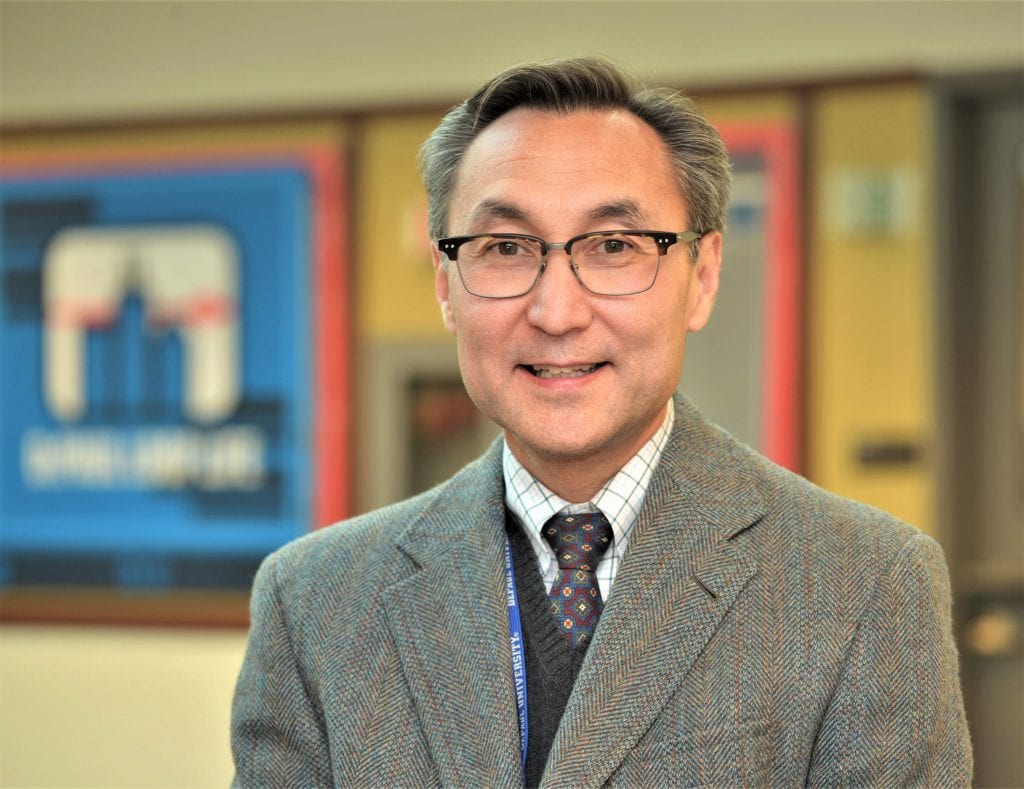
Whether you are a recent graduate about to enter the job market or an alumnus looking for a raise or new employment opportunities, one of the most important skills you need to master is negotiation. We asked Driehaus College of Business Associate Professor of Management Charles E. Naquin, an organizational behaviorist and co-author of “The Essentials of Job Negotiations: Proven Strategies for Getting What You Want,” for advice that will tip the job negotiation scale in your favor.
How should I respond when they ask how much I expect to make?
Generally speaking, don’t answer this question. Instead, you should respectfully deflect. A key word here is respectfully. A job negotiation should never be antagonistic. However, you do want to deflect because answering this question typically never helps you and can actually hurt you. So, don’t play that game—instead, respectfully deflect. Here are some examples:
“I’m getting my MBA so my prior salary doesn’t matter.”
“I’m switching industries so my prior salary should not be considered.”
“What I’m making does not matter so much, what I would like is to be paid competitively to my peers.”
You get the picture—respectfully deflect and have a few responses in your back pocket. This is a question you will likely have to address on multiple occasions during the same interaction.
Will I offend my future boss/employer because I am negotiating the job offer?
That’s a myth. Keep it respectful, not antagonistic, and you should be fine. In fact, it is more likely that your future employer will respect you even more if you negotiate because you are obviously business savvy.
What do employers dislike about job negotiations?
Most employers making job offers expect you to negotiate and many will actually offer a starting salary lower than what they expect to actually pay you because they anticipate you’ll negotiate it to a higher level. Therefore, employers typically expect negotiations and they don’t dislike them. What they DO tend to dislike are protracted job negotiations (so keep it short) or someone who pits one job offer against another (so don’t do that).
What is the biggest error that people make in job negotiations?
I would say the biggest error I see in job negotiations from a candidate’s perspective is negotiating before you even have an offer in hand. There are a number of reasons why you do not want to start negotiating before you get a written offer. Among them is that a verbal offer is easy to withdraw, while a written offer is not. In addition, once you get a written offer, the nature of the interaction changes — they (your potential employer) switch from “who should I make an offer to” to “how do we get you to sign.”
What is the NEXT biggest error you see in job negotiations?
The second biggest mistake is negotiating the job package over email (or worse yet, texting) when face-to-face is a viable option. Arranging a face-to-face meeting is often more work than emailing (or texting), but the dynamics in face-to-face job negotiations tend to work to your advantage while the dynamics of email (or texting) tend to work to your disadvantage — again, this is true in job negotiations (and is not true for all negotiations).
There are a number of reasons why this is the case. A person will have a harder time declining your requests when they are face-to-face with you than if they were looking at your requests on a computer screen. In addition, it sends the message that you place a high priority on this job opportunity if you take the time to meet face-to-face.
I once had a student fly from Chicago to Kansas City for what ended up being a 15-minute conversation about a job package, and ended up with several thousand dollars more in salary. Would this have happened over the phone? Maybe, but a jump in base salary in the thousands paid for that trip many times over and increased the odds of getting a favorable response. That investment in time and airfare for a face-to-face meeting was a worthy investment in my mind.
Offer to take your potential employer for a cup of coffee (as an example) and have a face-to-face conversation about the job offer. Negotiating job packages face-to-face is to your advantage, so take the time to set up a meeting.
What is your advice for asking for a raise?
That is a common question when I talk to alumni. People who have been working for a number of years may come to realize they are getting paid less than the market wage. Naturally, they want to know how to get a raise—at least get paid what the going market wage is. Is there a way to do this? Well, let me be upfront here — negotiating a new job offer is much easier than getting a raise internally in an organization. Internally there are many restrictions — whether it is administrative (e.g., caps on raises) or political (e.g., your boss does not like you). Here is the best strategy to take, in the sense that it is generally the one that is most likely to work — change companies. When you switch companies your salary tends to be reset to market wage.
What if you don’t want to change companies, do you have advice on getting a raise?
That is a complex issue that cannot be covered properly in a forum like this Q&A, but there are a few things you should know that can be helpful. First, for you to get a big raise you should make sure you are on good terms with your boss. If not, forget it — look for another position, whether internal or external. Second, figure out where you are salary wise in the company. Often companies will have a range of salaries for each level, often called bands. Find out where you are in your band. This knowledge will help when you talk with your boss about what it takes move up in the band, or if you are at the top of the band, discuss with your boss what it will take to go to the next level and higher band.
By Andrew Zamorski

by jlansber | Oct 3, 2018 | Features
-

-
1948 | MBA degree program founded.
-

-
1950 | First MBA class graduates.
-
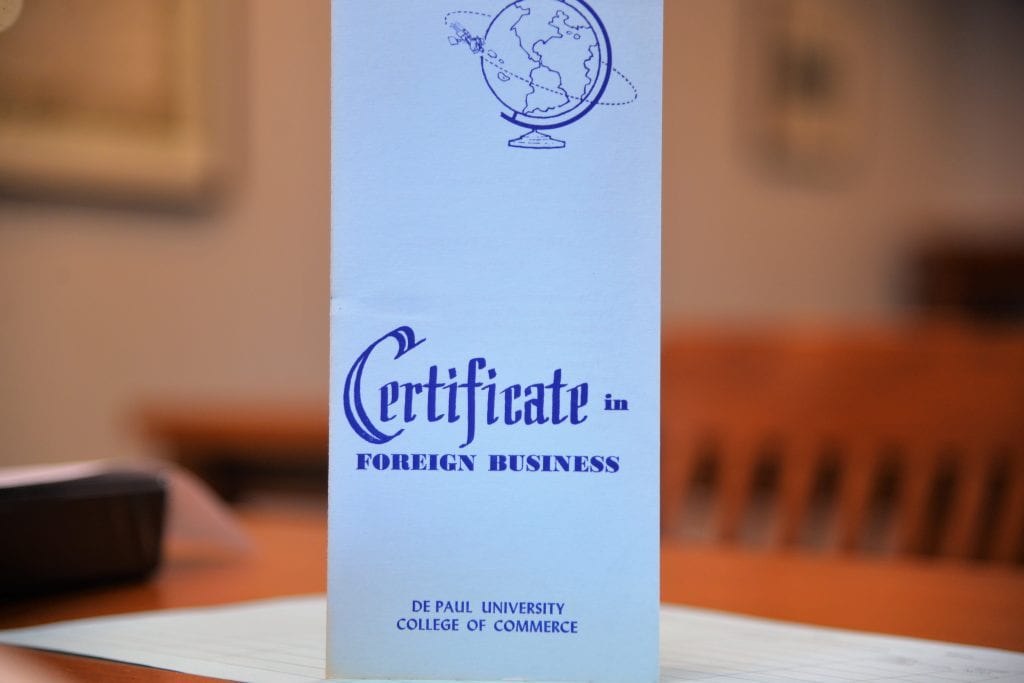
-
1962 | MBA in international business launched, one of the first in the nation.
-
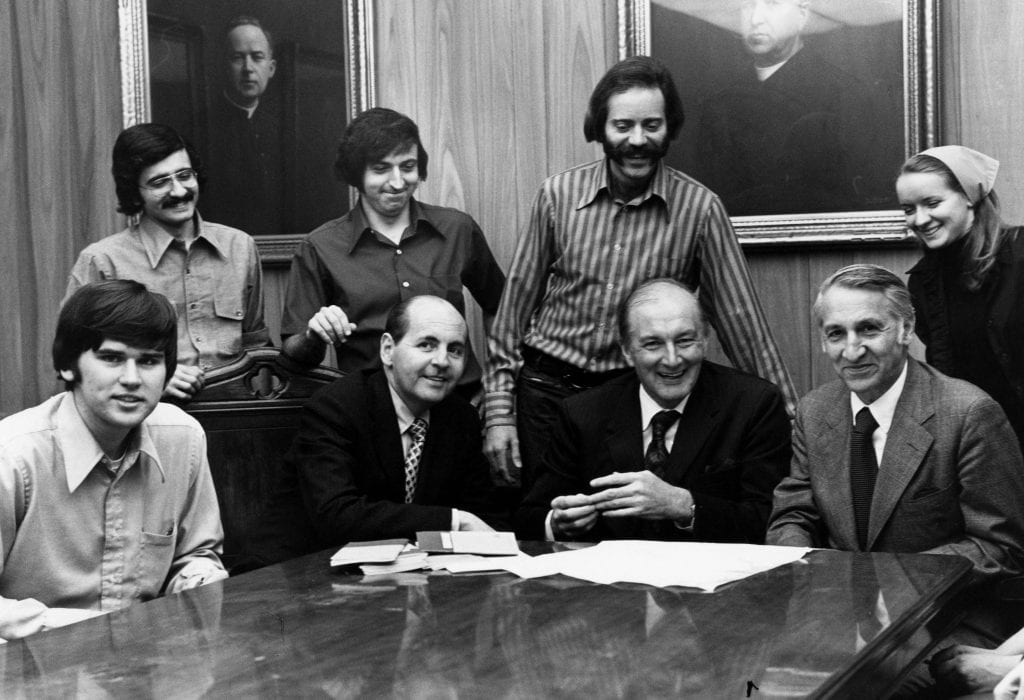
-
1967 | MBA program earns first accreditation from the
Association to Advance Collegiate Schools of Business.
-

-
1992 | Kellstadt Foundation donates $9 million to DePaul’s graduate business school, which is named the Charles H. Kellstadt
Graduate School of Business.
-

-
1993 | Kellstadt and its MBA program move to the newly renovated DePaul Center. Federal Reserve Chairman Alan Greenspan marks the occasion by delivering an address about emerging economies.
-
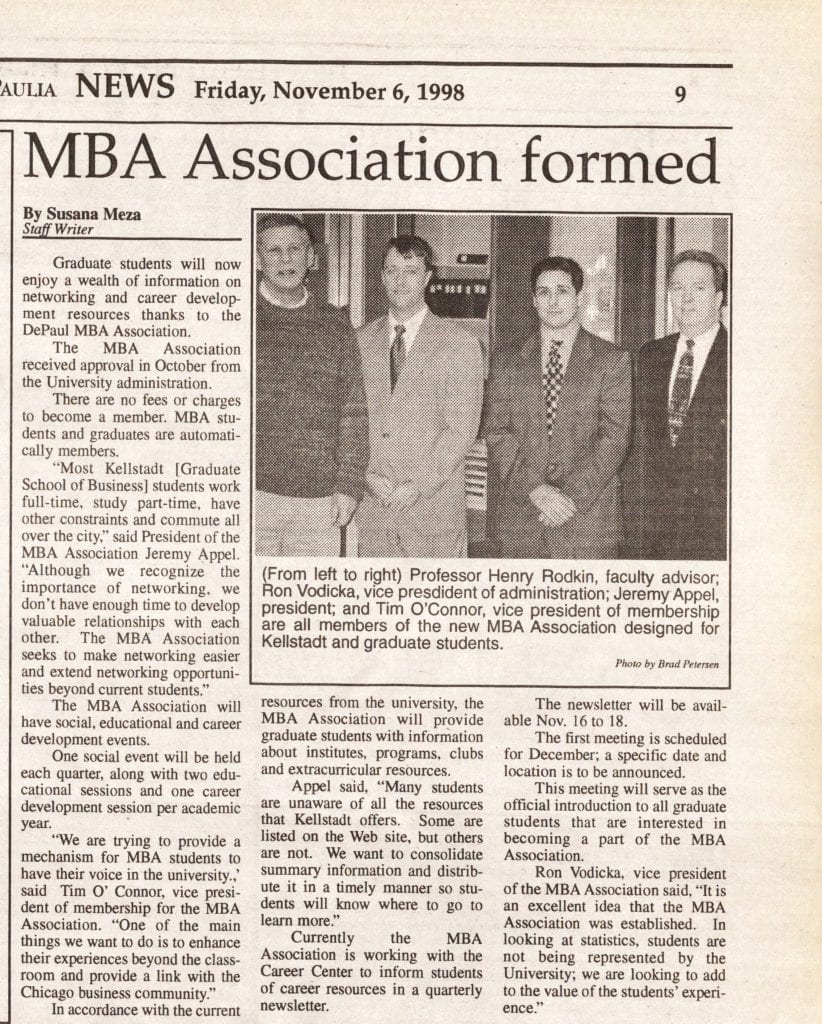
-
1998 | DePaul MBA Association, a student organization, formed.
-
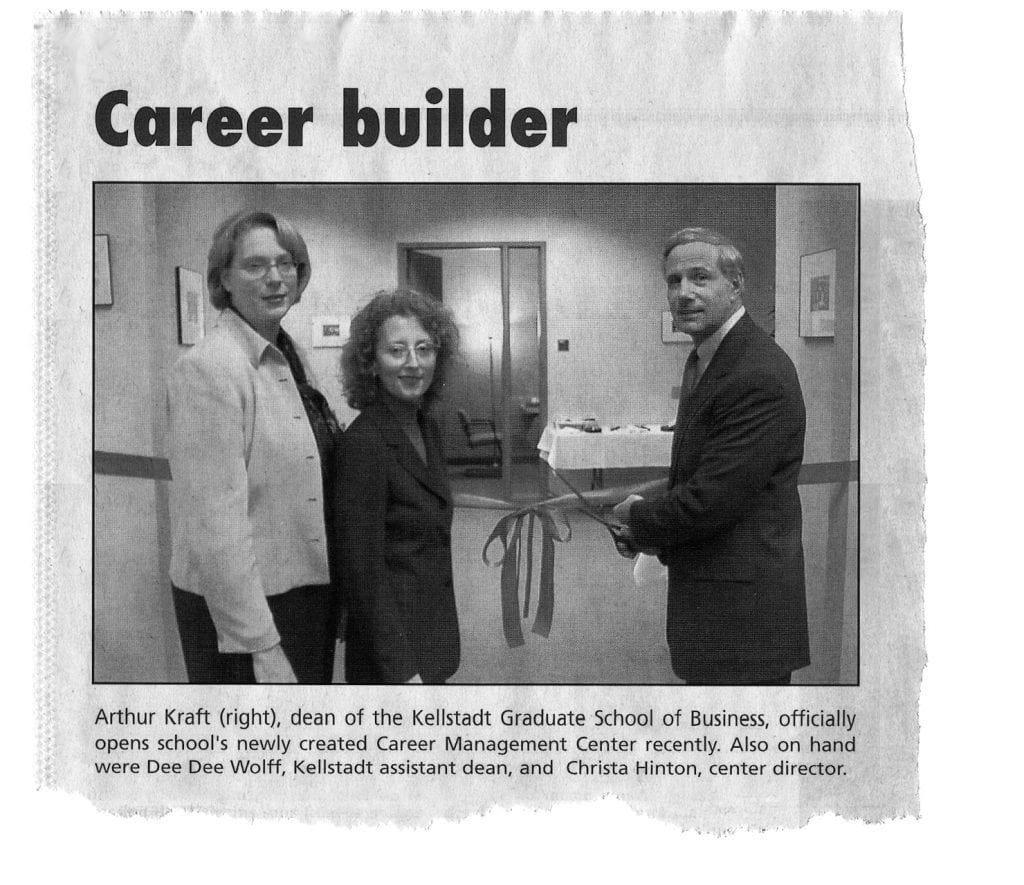
-
2001 | The Kellstadt Career Management Center opens.
-
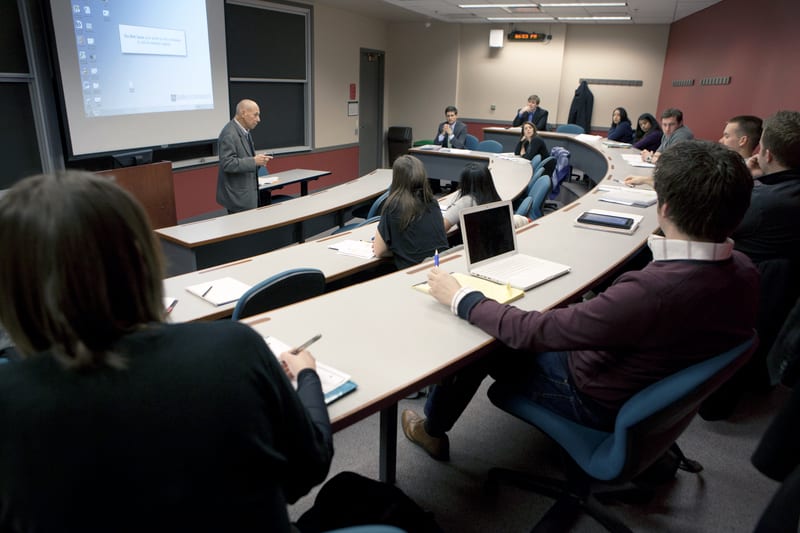
-
2002 | Weekend MBA program open.
-

-
2012 | Alumnus Richard H. Driehaus (BUS ’65, MBA ’70, DHL ’02) donates $30 million to DePaul’s business
college, which is named for him.
-

-
2014 | Kellstadt and the Corporate and Employer Outreach initiative recruit first on-site corporate MBA program cohort.
-
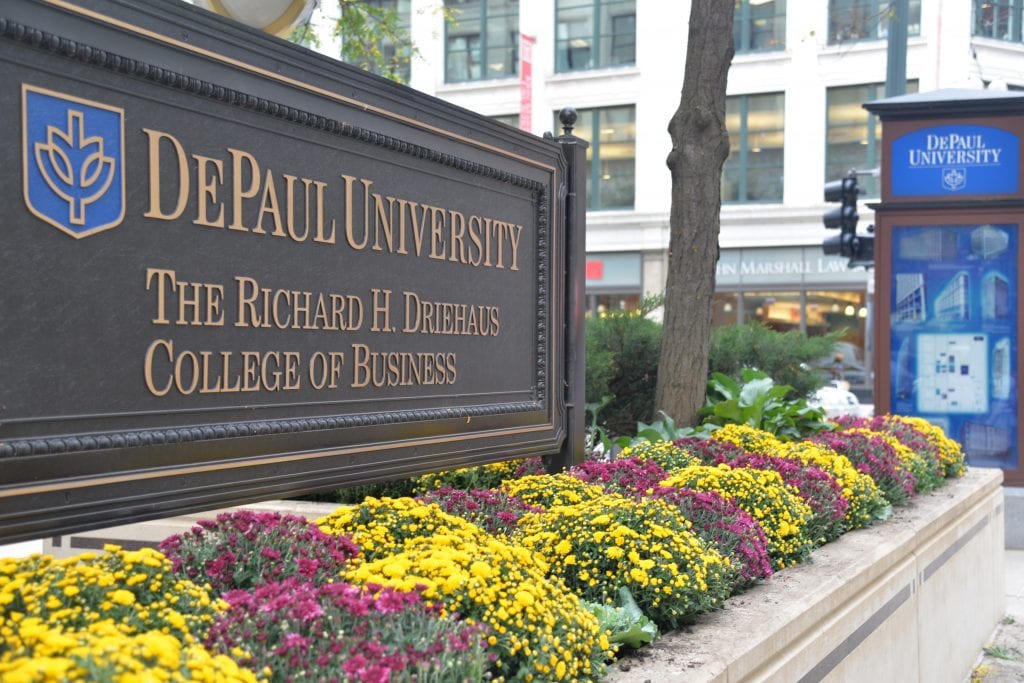
-
2018 | Day, evening and weekend MBA programs, as well as 12 MBA cohorts with corporate partners, are offered.

by jlansber | Oct 3, 2018 | Features

The late John P. Graven (back row, far left), a World War II veteran who attended DePaul on the GI Bill, established scholarship funds to help others earn DePaul degrees.
John P. Graven (BUS ’49, MBA ’50) was in DePaul’s first class of 15 MBA graduates. Like many college students of his era, he was a veteran of World War II. He served in the U.S. Army, and memories of his wartime experiences were still fresh in his mind when he entered DePaul. One memory, which he later shared with his wife, remained especially vivid.
“He was among the troops that liberated Buchenwald,” says Anastasia P. Graven (MA ’64) of her husband, who died at age 81 in 2006. The Buchenwald concentration camp near Weimar, Germany, held Holocaust survivors and political prisoners from across Europe. “The American Army wanted to reassure the prisoners that they were not another army coming to overcome them. The generals said, ‘We have to explain to the prisoners that we are here to save them.’”
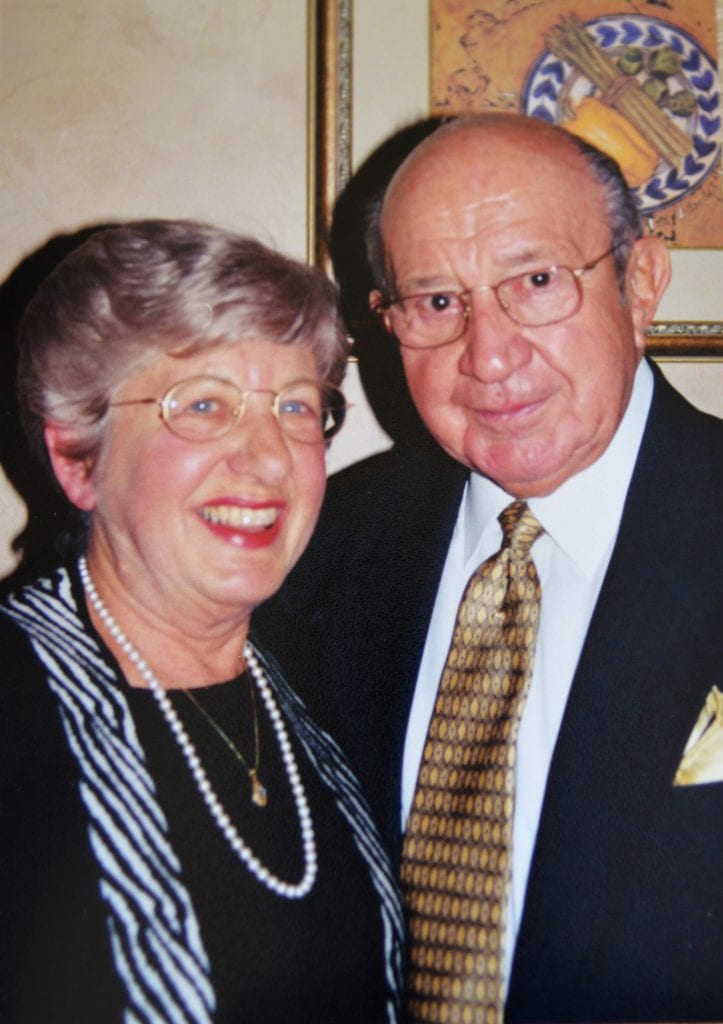
Anastasia Graven
and her husband,
the late John Graven.
The commanders asked GIs who spoke the detainees’ various languages to step forward to tell the survivors they were free. Graven, the son of Greek immigrants who settled in Chicago, volunteered to talk to the Greek survivors. “They told him to say, ‘We are Americans, we are here to help you and save you and return you to your own countries,’” Anastasia says. “The Greek prisoners fell on their knees, kissed (the soldiers’) hands and thanked them. He was a 19-year-old kid, overwhelmed by all this. It was a very moving event in his life.”
When Graven’s service ended, he returned to Chicago. “It was an opportunity to proceed in life after a harrowing experience,” his wife says. “He wanted to go back to school on the GI Bill, which of course was a big godsend. The GI Bill opened up education for many of that generation. Going to university then was an elite thing.” DePaul’s mission served the non-elite, including military veterans and the children of immigrants who wanted to expand their prospects through education. “DePaul opened its arms and made them feel welcomed, comfortable and accepted,” she says. “He treasured the whole experience.”
Graven entered DePaul’s MBA program right after earning his bachelor’s degree in accountancy. “He always was a numbers man,” Anastasia says. “He worked in accounting at a CPA firm, but he wanted to have the MBA.” He left the firm, attended MBA classes during the day and taught accounting at a junior college at night.
John and Anastasia met in 1949 after Easter Sunday services at Saints Constantine and Helen Greek Orthodox Church, then located on Chicago’s South Side. “He introduced himself and said, ‘Who are you?’” she recalls. “I told him, and he said, ‘I think you are the woman I am going to marry.’” They tied the knot in 1952.
John convinced Anastasia to get her master’s degree at DePaul, and they both went to work in the Chicago Public School system. John was a principal at Taft High School and an assistant superintendent; Anastasia was a principal at Boone Elementary and Stephen Decatur Classical School.
John considered DePaul his “saving place,” Anastasia says. “He told me, ‘When the time comes, and if I have the capacity, I want to support students who go there.’” In 2008, Anastasia established the John and Anastasia Graven Scholarship Funds to benefit business and music students, and she later added an accountancy student scholarship fund.
“John always said he got a good education and it provided him with opportunities to develop and move into the future,” says Anastasia. Through the Gravens’ scholarship funds, 29 DePaul students to date have had the same opportunity to attend DePaul and expand their horizons.
By Robin Florzak
Read about DePaul MBA grads from other decades:
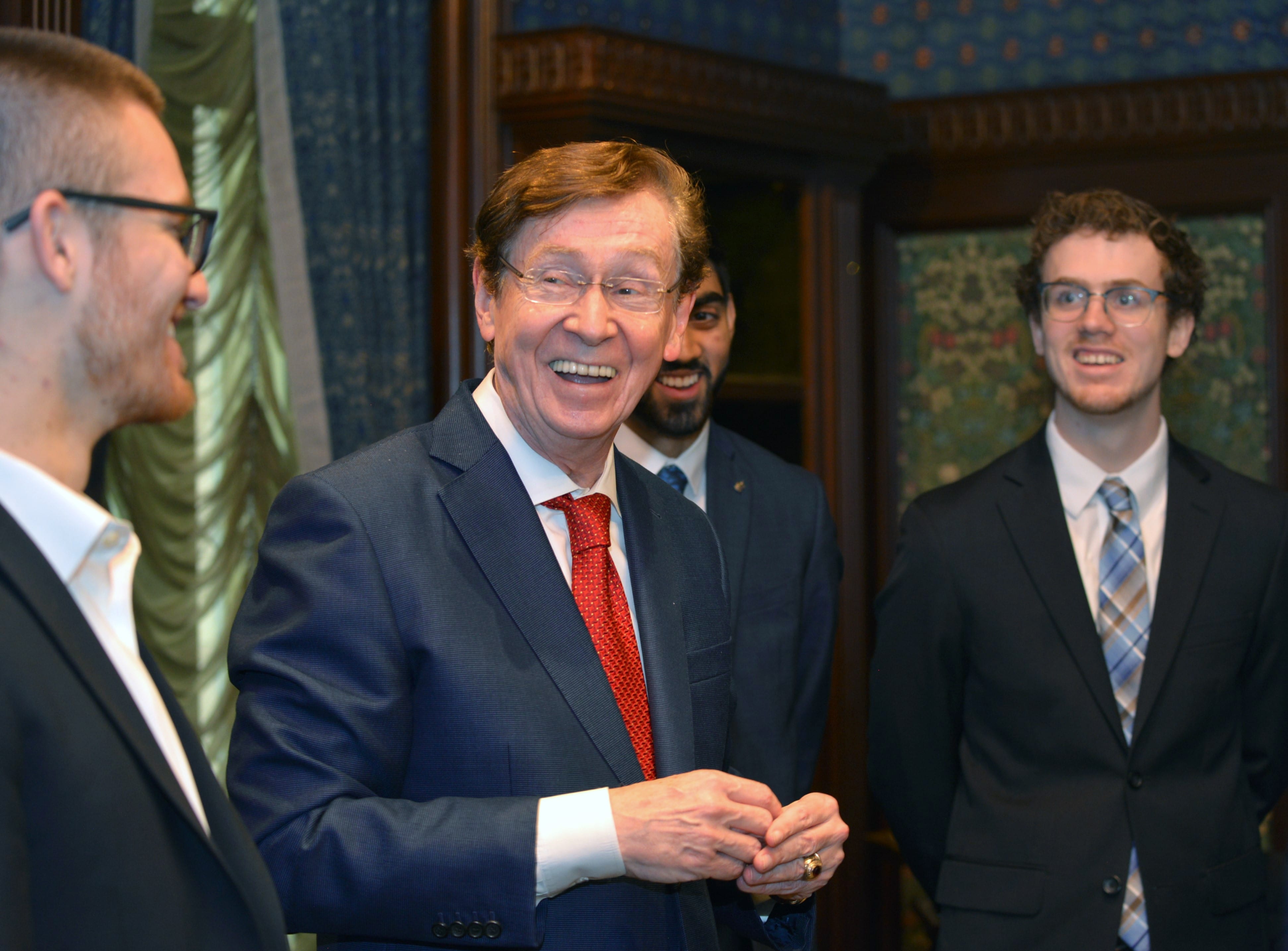
by jlansber | Oct 3, 2018 | Features
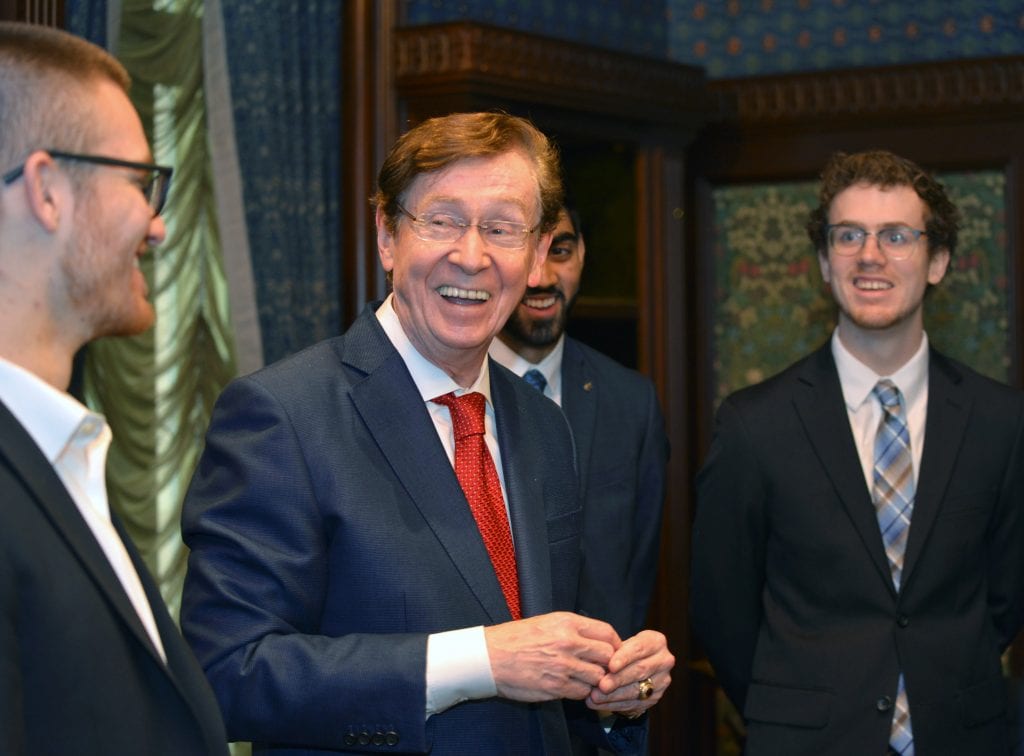
Richard Driehaus (BUS ’65, MBA ’70, DHL ’02) gave DePaul a $30 million gift in 2012 to support the recruitment and retention of top business faculty members, and also has contributed to international business and finance education initiatives.
Richard H. Driehaus (BUS ’65, MBA ’70, DHL ’02), a finance industry pioneer and philanthropist, and James Jenness (BUS ’69, MBA ’71, DHL ’06), former Kellogg Co. CEO and chairman, both rose from humble beginnings on Chicago’s South Side to become successful business leaders after earning MBAs from DePaul.
Driehaus remembers fondly many of his DePaul business professors and credits one of them, economics Professor William A. Hayes, for encouraging him to finish a final class assignment necessary for earning his MBA. “I was out of the program for a couple years, and he called me up to tell me I had to get in a paper in order to get my MBA degree,” he recalls.
Driehaus submitted a paper titled “The Formation of a New Theory on Growth Investing.” “I was always interested in growth stocks and growth investing,” he says. “Earnings growth is the primary motive of business, so we seek stocks with the following characteristics: accelerating sales and earnings, desirable supporting fundamentals, upward estimate revisions and positive earnings surprises.”
My DePaul education was an important factor in how my career and life have evolved. I commend the university for creating an environment that not only excels in education, but does so in a benevolent way.” – Richard H. Driehaus
The paper coalesced Driehaus’s momentum investing philosophy, which he used to found Driehaus Capital Management in 1979. The philosophy still guides his firm’s investment decisions today.

James Jenness (BUS ’69, MBA ’71, DHL ’06), former Kellogg Co. CEO and chairman, says DePaul “opened up the world” for him.
Jenness, a graduate of Chicago’s Fenger High School, says he wasn’t a very good student until he came to DePaul’s business college. “The quality of the teachers was great,” he says. “Most of the teachers had real-world experience, which I found very valuable.”
“DePaul opened up the world for me,” he says. “I was really interested in marketing, and I wanted to work for a major company. Getting an MBA was a critical piece to be able to do that.”
Jenness rose in the ranks to become vice chairman and chief operating officer of the Leo Burnett advertising agency, and later was tapped to lead Kellogg, one of Burnett’s clients. “I have been lucky enough to work for some great companies and to become the chairman of the board of one of the world’s greatest companies, Kellogg, where I still serve on the board,” he says. “Without a DePaul education, my undergraduate and MBA education, that would never have happened. DePaul was great enabler for me to reach my potential, and I am very grateful for it.”
Both Jenness and Driehaus have given generously of their time and resources to support DePaul’s mission. Jenness chaired DePaul’s Board of Trustees (2011–14) and serves on the business college’s advisory council. Driehaus gave DePaul a $30 million gift in 2012 to support the recruitment and retention of top business faculty members, and also has contributed to international business and finance education initiatives. DePaul acknowledged his devotion to the university by naming the business college for him.
“My DePaul education, as both an undergraduate and through the graduate school of business, was an important factor in how my career and life have evolved,” Driehaus said at the college naming ceremony in 2012. “I commend the university for creating an environment that not only excels in education, but does so in a benevolent way.”
By Robin Florzak
Read more about DePaul MBA grads from other decades:






















